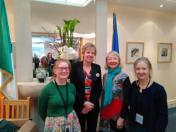-
Courses

Courses
Choosing a course is one of the most important decisions you'll ever make! View our courses and see what our students and lecturers have to say about the courses you are interested in at the links below.
-
University Life

University Life
Each year more than 4,000 choose University of Galway as their University of choice. Find out what life at University of Galway is all about here.
-
About University of Galway

About University of Galway
Since 1845, University of Galway has been sharing the highest quality teaching and research with Ireland and the world. Find out what makes our University so special – from our distinguished history to the latest news and campus developments.
-
Colleges & Schools

Colleges & Schools
University of Galway has earned international recognition as a research-led university with a commitment to top quality teaching across a range of key areas of expertise.
-
Research & Innovation

Research & Innovation
University of Galway’s vibrant research community take on some of the most pressing challenges of our times.
-
Business & Industry

Guiding Breakthrough Research at University of Galway
We explore and facilitate commercial opportunities for the research community at University of Galway, as well as facilitating industry partnership.
-
Alumni & Friends

Alumni & Friends
There are 128,000 University of Galway alumni worldwide. Stay connected to your alumni community! Join our social networks and update your details online.
-
Community Engagement

Community Engagement
At University of Galway, we believe that the best learning takes place when you apply what you learn in a real world context. That's why many of our courses include work placements or community projects.
News
Votes for Women 1918-2018
Tuesday, 6 February 2018

On 6 February, 1918, the Representation of the People Act extended the parliamentary vote to women. This political right was restricted to women over the age of 30 who met specified property qualifications or who held university degrees. An estimated 8.5 million women were qualified under the terms of the legislation – roughly 40% of the total number of potential women electors. In contrast, men were entitled to vote at age 21. The Act also extended local franchises to women and men alike and addressed war-time disruption of existing residency requirements.
The 1918 Act gave partial or restricted rights to women only, reflecting long-entrenched class and gender-informed thinking. The clause, to grant votes to women, was resisted in the House of Lords until January 1918 - right to the end. In light of the long-held fear of the place and the power of the woman elector, the granting of votes to women in 1918, though restricted, was a revolutionary moment in women’s political history. In Ireland, the age of voting for women was lowered to age 21 in 1922 and, in England and post-partition North of Ireland, it was equalised only in 1928.
The story of votes for women opens up important opportunities to think about citizenship, democracy, social class and how and why political life is shaped as it is. It is a time to reflect upon the arguments and ideas of those who campaigned to change the law; much of what they wanted to change still remains to be done.
Mary Clancy, 6 February, 2018
Keywords: Political Science, Public Policy, Social sciences, Sociology .

















